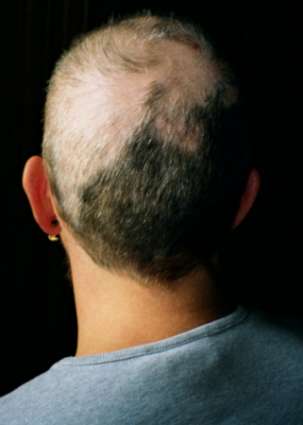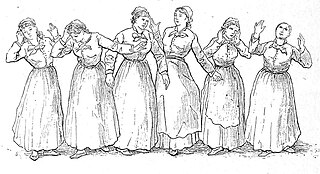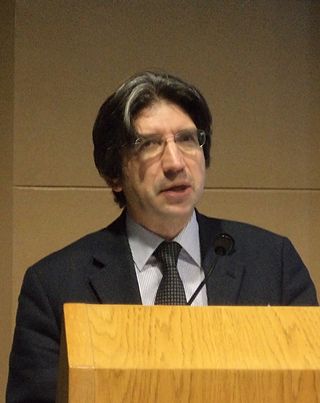Related Research Articles

Cognitive behavioral therapy (CBT) is a psycho-social intervention that aims to reduce symptoms of various mental health conditions, primarily depression and anxiety disorders. CBT focuses on challenging and changing cognitive distortions and their associated behaviors to improve emotional regulation and develop personal coping strategies that target solving current problems. Though it was originally designed to treat depression, its uses have been expanded to include the treatment of many mental health conditions, including anxiety, substance use disorders, marital problems, and eating disorders. CBT includes a number of cognitive or behavioral psychotherapies that treat defined psychopathologies using evidence-based techniques and strategies.

Trichotillomania (TTM), also known as hair-pulling disorder or compulsive hair pulling, is a mental disorder characterized by a long-term urge that results in the pulling out of one's own hair. A brief positive feeling may occur as hair is removed. Efforts to stop pulling hair typically fail. Hair removal may occur anywhere; however, the head and around the eyes are most common. The hair pulling is to such a degree that it results in distress and hair loss can be seen.

Hysteria is a term used colloquially to mean ungovernable emotional excess and can refer to a temporary state of mind or emotion. In the nineteenth century, hysteria was considered a diagnosable physical illness in women. It is assumed that the basis for diagnosis operated under the belief that women are predisposed to mental and behavioral conditions; an interpretation of sex-related differences in stress responses. In the twentieth century, it shifted to being considered a mental illness. Many influential people such as Sigmund Freud and Jean-Martin Charcot dedicated research to hysteria patients.

Ida B. Wells was an American investigative journalist, educator, and early leader in the civil rights movement. She was one of the founders of the National Association for the Advancement of Colored People (NAACP). Wells dedicated her lifetime to combating prejudice and violence, the fight for African-American equality, especially that of women, and became arguably the most famous Black woman in the United States of her time.
Self-hatred is personal self-loathing or hatred of oneself, or low self-esteem which may lead to self-harm.
Stereotype threat is a situational predicament in which people are or feel themselves to be at risk of conforming to stereotypes about their social group. It is theorized to be a contributing factor to long-standing racial and gender gaps in academic performance. Since its introduction into the academic literature, stereotype threat has become one of the most widely studied topics in the field of social psychology.

Excoriation disorder, more commonly known as dermatillomania, is a mental disorder on the obsessive–compulsive spectrum that is characterized by the repeated urge or impulse to pick at one's own skin, to the extent that either psychological or physical damage is caused.

Dan Joseph Stein is a South African psychiatrist who is a professor and Chair of the Dept of Psychiatry and Mental Health at the University of Cape Town, and Director of the South African MRC Unit on Risk & Resilience in Mental Disorders. Stein was the Director of UCT's early Brain and Behaviour Initiative, and was the inaugural Scientific Director of UCT's later Neuroscience Institute. He has also been a Visiting Professor at Mount Sinai School of Medicine in the United States.

Edna Foa is an Israeli professor of clinical psychology at the University of Pennsylvania, where she serves as the director of the Center for the Treatment and Study of Anxiety. Foa is an internationally renowned authority in the field of psychopathology and treatment of anxiety. She approaches the understanding and treatment of mental disorders from a cognitive-behavioral perspective.
Mental distress or psychological distress encompasses the symptoms and experiences of a person's internal life that are commonly held to be troubling, confusing or out of the ordinary. Mental distress can potentially lead to a change of behavior, affect a person's emotions in a negative way, and affect their relationships with the people around them.
The Anxiety and Depression Association of America (ADAA) is a U.S. nonprofit organization dedicated to increasing awareness and improving the diagnosis, treatment, and cure of anxiety disorders in children and adults. Anxiety disorder is a class of mental disorders in which anxiety is the predominant feature. This disorder, an illness characterized by constant and boundless worry that interferes with daily life, is the most common psychiatric illness in the United States, affecting 40 million American adults. ADAA is involved in education, training, and research for anxiety and stress-related disorders. The mission statement of ADAA is to promote the prevention, treatment, and cure of anxiety, depression, and stress-related disorders through education, practice, and research.

Camille Olivia Cosby is an American television producer, philanthropist, and the wife of comedian Bill Cosby. The character of Clair Huxtable from The Cosby Show was based on her. Cosby has avoided public life, but has been active in her husband's businesses as a manager, as well as involving herself in academia and writing. In 1990, Cosby earned a master's degree from the University of Massachusetts Amherst, followed by a Doctorate of Education (Ed.D.) in 1992.

100 Greatest African Americans is a biographical dictionary of one hundred historically great Black Americans, as assessed by Temple University professor Molefi Kete Asante in 2002. A similar book was written by Columbus Salley. First published in 1992, Salley's book is titled The Black 100: A Ranking of the Most Influential African-Americans, Past and Present.

Obsessive–compulsive disorder (OCD) is a mental and behavioral disorder in which an individual has intrusive thoughts and/or feels the need to perform certain routines repeatedly to the extent where it induces distress or impairs general function. As indicated by the disorder's name, the primary symptoms of OCD are obsessions and compulsions. Obsessions are persistent unwanted thoughts, mental images, or urges that generate feelings of anxiety, disgust, or discomfort. Common obsessions include fear of contamination, obsession with symmetry, and intrusive thoughts about religion, sex, and harm. Compulsions are repeated actions or routines that occur in response to obsessions. Common compulsions include excessive hand washing, cleaning, counting, ordering, hoarding, neutralizing, seeking assurance, and checking things. Washing is in response to the fear of contamination. Ordering is the preference for tasks to be completed a specific way. Hoarding is the collecting of unnecessary objects. Neutralizing is the act of engaging in a ritual to make up for supposedly "bad behavior". Checking is the compulsion to check particular objects/places to ensure they are a certain way. People with OCD tend to be overly clean, repeatedly count objects, and seek reassurance to avoid making a mistake. Many adults with OCD are aware that their compulsions do not make sense, but they perform them anyway to relieve the distress caused by obsessions. Compulsions occur so often, typically taking up at least one hour per day, that they impair one's quality of life.
David F. Tolin, Ph.D. is an American clinical psychologist.
Minority stress describes high levels of stress faced by members of stigmatized minority groups. It may be caused by a number of factors, including poor social support and low socioeconomic status; well understood causes of minority stress are interpersonal prejudice and discrimination. Indeed, numerous scientific studies have shown that when minority individuals experience a high degree of prejudice, this can cause stress responses that accrue over time, eventually leading to poor mental and physical health. Minority stress theory summarizes these scientific studies to explain how difficult social situations lead to chronic stress and poor health among minority individuals.
Janet Allison Taylor Spence was an American psychologist who worked in the field of the psychology of anxiety and in gender studies.
John Piacentini, PhD, ABPP, is an American clinical child and adolescent psychologist, and professor of psychiatry and biobehavioral sciences at the David Geffen School of Medicine at UCLA in Los Angeles, California. He is the director of the Center for Child Anxiety, Resilience, Education and Support (CARES), and the Child OCD, Anxiety and Tic Disorders Program at UCLA’s Semel Institute for Neuroscience and Human Behavior.
Jerilyn Ross was an American psychotherapist, phobia expert, and mental health activist. The New York Times' Benedict Carey described her as "one of the country’s most visible and effective advocates for those with mental health problems."

The COVID-19 pandemic has impacted the mental health of people across the globe. The pandemic has caused widespread anxiety, depression, and post-traumatic stress disorder symptoms. According to the UN health agency WHO, in the first year of the COVID-19 pandemic, prevalence of common conditions such as depression and anxiety, went up by more than 25 per cent. The pandemic has damaged social relationships, trust in institutions and in other people, has caused changes in work and income, and has imposed a substantial burden of anxiety and worry on the population. Women and young people face the greatest risk of depression and anxiety.
References
- ↑ "University of Wisconsin". University of Wisconsin-Madison. Retrieved June 7, 2021.
- 1 2 3 4 "Kent State Professor Profile". Kent State. Retrieved June 9, 2021.
- ↑ "ADAA Profile". Anxiety and Depression Association of America. Retrieved June 9, 2021.
- ↑ "Jerilyn Ross Clinician Advocate Award". Anxiety & Depression Association of America. Retrieved June 7, 2021.
- ↑ "Book Review". Researchgate. Retrieved June 7, 2021.
- ↑ "Acting White". Wkyc Studios. Retrieved June 7, 2021.
- ↑ "Black Women Are Facing an Overwhelming Mental Health Crisis". Prevention. November 6, 2020. Retrieved June 7, 2021.
- ↑ "Sister Circles Workshop Press Release". PR Newswire. Retrieved June 7, 2021.
- 1 2 "NPR Teen Anxiety On The Rise". wbur. Retrieved June 8, 2021.
- ↑ "Forbes Article". Forbes. Retrieved June 8, 2021.